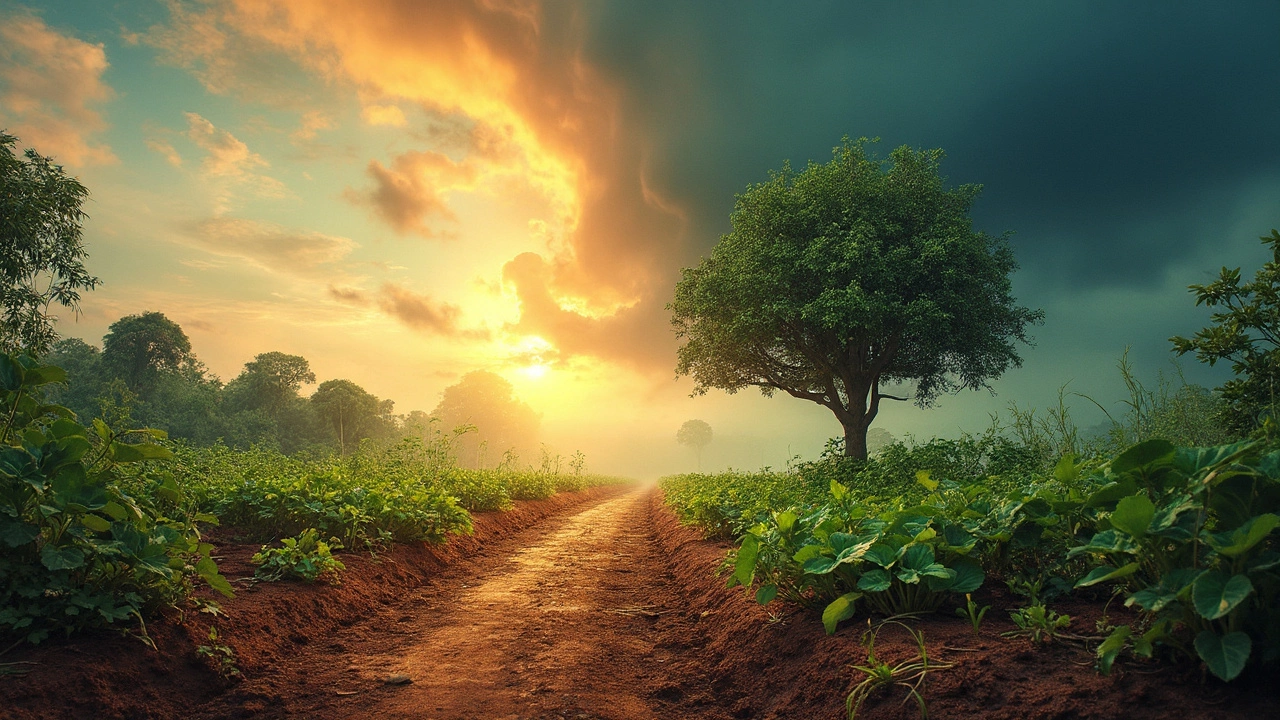When you're diving into sustainable gardening, there's this vegetable that can basically laugh in the face of adversity: kale. Ever thought about how some plants just don't give up, even when it feels like every condition is against them? Kale is like that stubborn friend who refuses to stay down, no matter what. It thrives almost everywhere, requires little maintenance, and offers a bounty of nutrients in return.
What's cool about kale is that it doesn't just survive; it thrives. Some gardeners might worry about pests or poor soil, but kale? It's as if it says, "Bring it on!" Whether facing chilly winds, poor soil, or marauding insects, kale holds its ground with impressive resilience.
But why do we care about resilient vegetables? Simple. They save us time and resources, which is a big win for anyone serious about sustainable gardening. Instead of constantly battling to keep your plants alive, you'd have more time to enjoy the fruits—or in this case, the leafy greens—of your labor.
- Understanding Vegetable Resilience
- Top Resilient Vegetables
- Tips for Growing Hardy Crops
- Benefits of Resilient Vegetables
Understanding Vegetable Resilience
Ever wondered why certain veggies seem to have a natural knack for survival? Well, the secret lies in their genetic make-up and natural adaptability. Resilient vegetables like kale and carrots have evolved traits that allow them to thrive even when conditions aren't ideal. In the gardening world, that means less sweat for you and more yield no matter the weather.
What Makes a Vegetable Resilient?
There are a few key factors. First, the root system. Strong, deep roots can access water veins deeper underground, which is super handy during dry spells. Secondly, toughness. Plants like kale can bounce back from light frost or pests. It's like they're wrapped in nature's own chain mail!
Also, some of these resilient vegetables have natural pest-repelling properties. Their leaves or stems might be unpalatable to insects, keeping the pests at bay and helping the vegetable grow unbothered.
Environmental and Economic Impact
Choosing hardy vegetables isn't just good for the garden; it's great for the planet. These crops require significantly less water and fertilizer, reducing both your water bills and your carbon footprint. Plus, less reliance on pesticides means you’re not putting extra chemicals into the ecosystem. Win-win!
If you're looking at a broader scale, such as community gardens or urban farming initiatives, going with tough veggies means less input for a bigger output, which can be crucial in addressing food security issues.
| Resilient Vegetable | Average Yield (lbs/plant) |
|---|---|
| Kale | 2.5 |
| Carrots | 1.2 |
| Spinach | 2.0 |
So next time you're planning your garden, remember, these hardy soldiers are not just easy to grow but also an environmentally conscious choice!
Top Resilient Vegetables
Now, let’s talk about a few toughie veggies that refuse to bow down to the elements. When we are considering strong crops that thrive despite what nature throws at them, kale isn’t the only star of the show.
1. Kale
Already mentioned it, but here’s more on why this leafy green takes center stage. You can plant kale in the early spring or late summer, and it’ll shrug off frost like it's nobody’s business. Farmers and backyard gardeners alike adore this vegetable for its robustness and its bounty of nutrients, including vitamins A, C, and K.
"Kale is the ultimate green when it comes to environmental resilience," says Dr. Andrew Parker, horticulturist at the National Gardening Association.
2. Swiss Chard
Swiss chard's rainbow-colored stalks aren't just for show. This plant is a hardy champion and can handle both cold temps and heatwaves, making it a go-to for gardens in varied climates. It’s not picky about soil quality either, and it's packed with magnesium and iron.
3. Radishes
If you want a vegetable that grows fast and tough, look no further than radishes. They mature quickly—often within a month—and don’t need much space. Whether you're growing them in full sun or partial shade, these small roots will push through, and help improve soil quality while doing so.
4. Carrots
Carrots have that superhero knack of growing through rough soil conditions. They’re versatile enough to be sown in spring, summer, or even late into fall, allowing for multiple harvests. Plus, they’re loved by both the dinner plate and health experts alike for their beta-carotene content.
5. Cabbage
Last but not least, cabbage is known for handling less-than-stellar weather like a pro. Though it grows slow and steady, its high yield by the end of the season makes it worth the wait.
These resilient vegetable options provide you with tasty returns without demanding too much attention. It's the kind of low-risk, high-reward situation every gardener dreams about.

Tips for Growing Hardy Crops
Getting into the groove of sustainable gardening? Then you're going to want to know how to make the most of hardy crops like kale, radishes, and Swiss chard. These guys can handle more than you'd think, making them perfect for beginners or those looking to streamline their gardening efforts.
Pick the Right Spot
Even though these veggies are tough and forgiving, they do appreciate a bit of care in the beginning. Start by picking a sunny spot with good drainage. Most hardy veggies love sunshine, but on blazing hot days, don't be afraid to offer them some shade.
Prepare Your Soil
Soil is the foundation, right? Make sure you're giving your plants a solid start. Mix some compost or well-rotted manure into your soil before planting. This boosts the soil's nutrient content, giving your crops all they need for a strong start. Plus, you can't go wrong with a little extra organic matter in there.
Water Wisely
These resilient vegetables might not be thirsty, but they do need consistent watering, especially when they're getting established. Keep the soil moist, but not soaked—like a well-wrung sponge. Early mornings or late evenings are your best bet to avoid water evaporation.
Mulch is Your Friend
Add a layer of mulch around your plants. It keeps the soil cool and moist while keeping the weeds away, which, let's face it, is always a win. Plus, as the mulch breaks down, it adds organic material to the soil.
- Use straw, wood chips, or even dried leaves as mulch.
- Keep the mulch a couple of inches away from the stems to prevent rot.
Pest Control
While some pests fear these hardy veggies, others see them as a free buffet. Natural pest deterrents like coffee grounds, crushed eggshells, or introducing ladybugs can keep those nibblers at bay without harmful chemicals.
Growing resilient vegetables isn’t just smart—it’s efficient and sustainable. With a little preparation and care, you’ll soon have a garden that's as tough and enduring as the crops it produces.
Benefits of Resilient Vegetables
Ever thought about why planting resilient vegetables like kale could be a game-changer? These tough crops are your go-to solution for greener gardening that cuts down on waste and effort.
Low Maintenance: Resilient vegetables don't need you to hover over them like a helicopter parent. They thrive in tough conditions, meaning less watering, less fussing, and basically more time for sipping lemonade on the porch.
Reduced Resource Use: Using less water and fewer chemicals? Yes, please! These crops thrive in sketchy soil and unpredictable weather, making them a perfect fit for sustainable gardening.
Environmental Benefits
Less resource demand means a smaller environmental footprint. You can say goodbye to excessive fertilizers and pesticides that usually wash into water systems and harm wildlife.
| Vegetable | Water Usage | Maintenance Level |
|---|---|---|
| Kale | Low | Low |
| Swiss Chard | Low | Low |
Nutritional Value
Beyond saving time and resources, these hardy vegetables pack an impressive nutritional punch. Kale, for example, is loaded with vitamins A, C, and K, fiber, calcium—the list goes on. You're cultivating health as much as greenery.
Economic Savings
One cool upside is how much money you'll save. Buying fewer supplies? Yeah, that translates to extra bucks in your pocket. It's not just about spending less; it's about getting more from what you sow.
So, if you want an efficient, eco-friendly garden with real benefits, lean into the world of resilient vegetables. They'll have your back through harsh conditions, paving the way for food security and a healthier planet.

